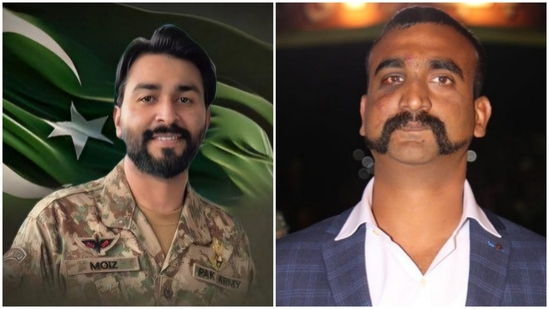In a stark reminder of Pakistan’s spiraling internal security crisis, Major Syed Moiz Abbas Shah the officer who claimed credit for capturing Indian Air Force hero Group Captain Abhinandan Varthaman in 2019 was killed during a counterterrorism operation against the Tehreek-e-Taliban Pakistan (TTP) in South Waziristan.
As terror groups once fostered by Pakistan now turn against the state, the killing of a senior military officer in an intelligence-based operation has further exposed the vulnerabilities of the Pakistani establishment. The growing unrest in Khyber Pakhtunkhwa and bordering tribal regions threatens to plunge the country deeper into chaos.
The 2019 Balakot Strikes and Abhinandan’s Heroic Return
Major Moiz Abbas Shah gained attention in 2019 for claiming he helped capture Wing Commander (now Group Captain) Abhinandan Varthaman following the fierce India-Pakistan aerial skirmish over Jammu & Kashmir. This dogfight came a day after Indian Air Force jets crossed into Pakistani territory on February 26, 2019, to strike a Jaish-e-Mohammed training facility in Balakot a retaliatory measure after the Pulwama terror attack that killed 40 CRPF personnel.
On February 27, Pakistan attempted a counterstrike targeting Indian military assets. In the ensuing aerial battle, Abhinandan’s MiG-21 Bison shot down a Pakistani F-16 before itself being hit. Abhinandan ejected and was captured by Pakistani forces. He was returned to India two days later, on March 1, under immense international pressure, with his courage and conduct earning widespread acclaim. Major Moiz Abbas Shah’s name was widely circulated in Pakistani media at the time as part of Islamabad’s military narrative.
Tehreek-e-Taliban Pakistan: Pakistan’s Frankenstein Monster
As per reports the death of Major Shah occurred during a counter-terror operation in Sararogha, South Waziristan, on June 24, 2025, when Pakistani forces targeted a TTP hideout. According to a report by Dawn, the operation led to the deaths of 14 Pakistani security personnel and several militants. The ISPR later confirmed that Major Shah and Lance Naik Jibran Ullah were among the slain. Despite Pakistan’s claims of success, the attack highlighted the growing strength and reach of the TTP.
The Tehreek-e-Taliban Pakistan, which was once cultivated by elements within Pakistan’s intelligence and security establishment, has now become one of the state’s fiercest internal enemies. The group has carried out repeated attacks on Pakistani forces, particularly in the restive tribal belt and Khyber Pakhtunkhwa. In July 2024, the Pakistani government officially labeled the TTP as Fitna-al-Khawarij and instructed all state institutions to refer to its members as Khariji (outcasts), in a desperate attempt to delegitimize the movement. However, these cosmetic measures have done little to halt the TTP’s resurgence.
Symbolism of Major Shah’s Death: A Turning Point?
The killing of Major Shah during an anti-TTP operation is laced with irony. Once part of a nationalistic triumph narrative after the Balakot dogfight, Shah’s death now underscores how Pakistan’s policy of differentiating between “good” and “bad” terrorists has backfired. The same groups once used as strategic assets are now targeting Pakistan’s own officers and installations.
The security vacuum in tribal regions, combined with economic instability and a weakening civil-military balance, has left the Pakistani Army overextended and increasingly vulnerable. In this context, the TTP’s aggressive offensives mark not just tactical victories, but a growing ideological and territorial threat to the Pakistani state.
Costs of Strategic Miscalculations
Major Moiz Abbas Shah’s death in an operation against the TTP reflects more than just the loss of a military officer it signifies the cost of Pakistan’s long-standing double game with terror groups. While Islamabad gained short-term strategic leverage by supporting proxies, it now faces a prolonged internal insurgency that threatens national cohesion.
As Pakistan’s military bleeds in regions it once claimed to control, questions arise about whether the state can ever regain stability without a complete overhaul of its internal and foreign policies. Meanwhile, India’s Balakot operation and the return of Abhinandan Varthaman remain testaments to a nation’s commitment to rooting out terror a resolve Pakistan continues to pay a heavy price for ignoring.





















